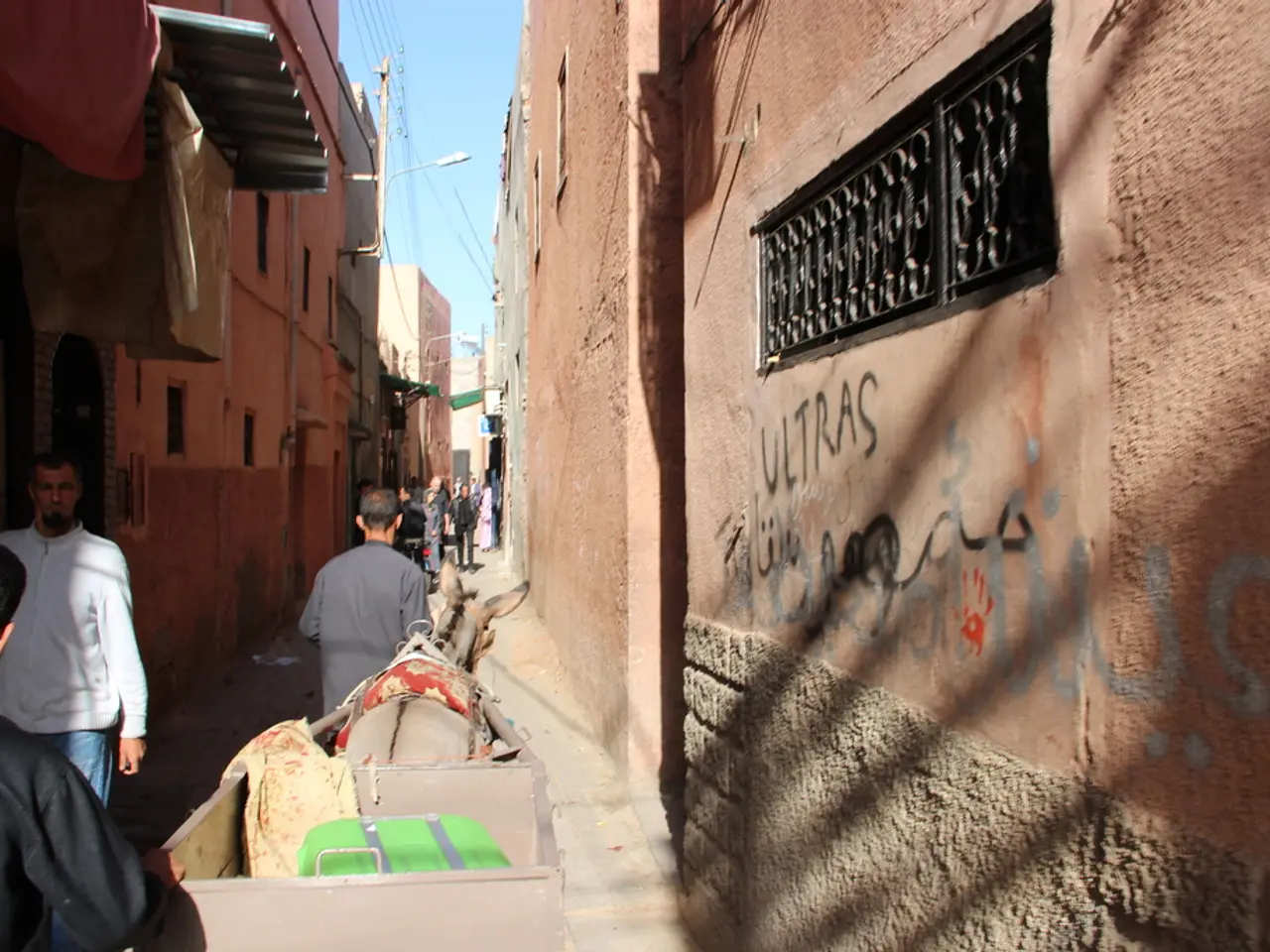Casualties in the Israeli military operation against Gaza exceed 60,000 Palestinian lives.
The Gaza Strip is currently facing a catastrophic humanitarian crisis, teetering on the brink of famine and infrastructure collapse. Over seven months of conflict, more than 70% of Gaza's infrastructure has been destroyed, displacing thousands and leaving only about 12% of the territory considered safe.
The crisis began on October 7, 2023, following a cross-border attack by Gaza's dominant Palestinian militant group, Hamas, which resulted in the death of around 1,200 people and the capture of over 250 hostages, according to Israeli authorities. The Israel-Gaza conflict has claimed at least 60,000 lives as of July 2025, according to the Gaza Strip's health ministry.
Israel's military operations have leveled entire neighborhoods in Gaza, displacing most of the population of 2.3 million. The United Nations (UN) has described the situation as an "epic humanitarian catastrophe" and a "dystopian landscape" marked by starvation, destruction, and a militarized aid distribution system that is failing to meet the scale of need.
Hospitals in Gaza are overwhelmed, treating over 20,000 children for malnutrition since April 2025. At least 16 children under five have died from hunger-related causes since mid-July. Over 320,000 children under five are at risk of acute malnutrition, and thousands have already suffered severe acute malnutrition, leading to dozens of deaths in recent months.
The UN has called for an immediate ceasefire, the release of hostages, and a massive increase in humanitarian aid to prevent further loss of life. Aid trucks are now moving towards Gaza from Egypt, while Jordan and the United Arab Emirates are airdropping supplies into the enclave. However, Israel claims it has allowed enough food into Gaza and blames the United Nations for failing to distribute it effectively.
The Israeli military has reportedly killed thousands of Hamas fighters in Gaza and destroyed hundreds of kilometers of tunnels used by the militants. Despite this, attempts to access food have resulted in hundreds of deaths and thousands of injuries since May 2025.
The conflict has drawn international condemnation and calls for a ceasefire. Images of starving Palestinians have alarmed the world in recent weeks, with the UN warning of a potential collapse of essential services and rampant outbreaks of disease due to the conflict. The U.N. Palestinian refugee agency, UNRWA, has reported that its staff, as well as doctors and humanitarian workers, are fainting on duty in Gaza due to hunger and exhaustion.
The latest round of indirect ceasefire talks in Doha between Israel and Hamas broke off last week with no deal in sight. As of Tuesday, the number of injured is 145,870, and thousands remain missing under the rubble. Palestinian health officials have warned that hundreds of people could soon perish as hospitals are overwhelmed with patients experiencing dizziness and exhaustion amid severe food shortages and a breakdown in aid deliveries.
In a bid to alleviate the crisis, Israel announced on Sunday a halt in military operations for 10 hours a day in parts of Gaza and new aid corridors. However, the conflict continues to take a heavy toll on the civilian population, with no end in sight.
[1] United Nations Office for the Coordination of Humanitarian Affairs (OCHA) [2] World Health Organization (WHO) [3] Amnesty International [4] Human Rights Watch (HRW) [5] Gaza Strip's health ministry
- The crisis in the Gaza Strip, a region currently on the brink of famine and infrastructure collapse, has been highlighted by numerous organizations, including the United Nations Office for the Coordination of Humanitarian Affairs (OCHA), the World Health Organization (WHO), Amnesty International, Human Rights Watch (HRW), and the Gaza Strip's health ministry.
- Beyond the war-and-conflicts in the region, other significant issues arise, such as the high numbers of car-accidents reported due to the increased movement of aid trucks and the influx of supplies into Gaza amid the crisis, causing further casualties.
- Simultaneously, politics play a crucial role in the ongoing crisis, as evidenced by the failure to reach a ceasefire during the latest round of indirect talks in Doha between Israel and Hamas, and the disagreements regarding the distribution of humanitarian aid, a matter of general-news interest. Moreover, recent developments in the area have drawn the attention of crime-and-justice organizations, with reports of thousands missing under the rubble, and increasing numbers of severe crime incidents.







